It is a well-known fact that fresh vegetables are healthy. However, not everyone knows that some vegetables become even more nutritious after cooking. Today, we’ll talk about carrots.
The main benefit of raw carrots is their high vitamin A content. Baking or preparing carrots in the Korean style increases this amount. In this article, we’ll discuss the benefits and potential drawbacks of carrots and the best ways to prepare them.
Table of contents
Chemical Composition of Raw and Cooked Carrots
Fresh vegetables can lose some of their beneficial properties during cooking — or, conversely, gain new ones. That’s why it’s important to know which vegetables are best eaten raw and which should be cooked properly.
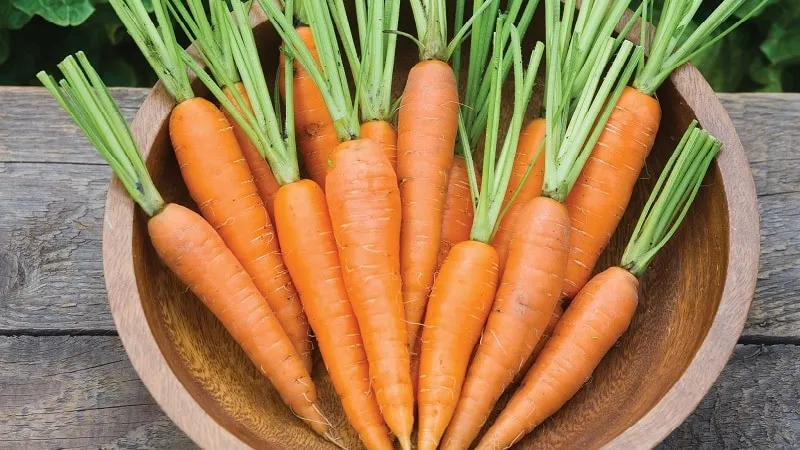
The table below shows the vitamins and minerals found in raw carrots and after different cooking methods.
| Vitamins | |||||
| Name | Raw | Stewed | Fried | Baked | Boiled |
| A, µg | 2000 | 5700 | 239.1 | 2714.3 | 852 |
| Beta-carotene, mg | 12 | — | 1.435 | 16.286 | 8.332 |
| B1, mg | 0.06 | 0.04 | 0.13 | 0.069 | 0.066 |
| B2, mg | 0.07 | 0.05 | 0.026 | 0.088 | 0.044 |
| B4, mg | 8.8 | — | — | — | 8.8 |
| B5, mg | 0.26 | 0.5 | 0.391 | 0.429 | 0.232 |
| B6, mg | 0.13 | 0.08 | 0.13 | 0.143 | 0.153 |
| B9, µg | 9 | 5.4 | 11.739 | 12.857 | 14 |
| C, mg | 5 | 1.4 | — | 2.86 | 3.6 |
| E, mg | 0.4 | 0.6 | 8.435 | 0.571 | 1.03 |
| H, µg | 0.6 | 0.04 | 0.078 | 0.086 | — |
| K, µg | 13.2 | — | 17.2 | 18.9 | 13.7 |
| PP, mg | 1.1 | 0.7494 | 1.5858 | 1.3546 | 0.645 |
| Alpha-carotene, µg | — | — | — | — | 3776 |
| Minerals | |||||
| Name | Raw | Stewed | Fried | Baked | Boiled |
| Iron, mg | 0.7 | 0.809 | 1.826 | 1.881 | 0.537 |
| Iodine, µg | 5 | 1.34 | — | — | 5.05 |
| Cobalt, µg | 2 | 2.697 | 2.609 | 0.088 | 2.02 |
| Manganese, mg | 0.2 | 0.2055 | 0.2609 | 0.0826 | 0.202 |
| Copper, µg | 80 | 85.12 | 104.35 | 10.67 | 80.81 |
| Molybdenum, µg | 20 | 7.31 | 26.087 | 0.647 | 20.202 |
| Selenium, µg | 0.1 | 0.947 | — | 0.241 | 0.101 |
| Fluoride, µg | 55 | 66.82 | 71.74 | 0.2 | 55.56 |
| Chromium, µg | 3 | 8.25 | 3.91 | — | 3.03 |
| Zinc, mg | 0.4 | 0.596 | 0.5217 | 0.0336 | 0.404 |
Baked carrots contain more vitamins than raw ones. The mineral content in raw and boiled carrots is almost the same.
The longer the vegetable is cooked, the more nutrients it loses. Prolonged stewing, frying, or boiling reduces its nutritional value. Baking preserves and even increases vitamin content but reduces minerals.

Carrot Juice
Freshly squeezed carrot juice contains the following vitamins and minerals (per 100 g):
- A — 350 µg;
- beta-carotene — 2.1 mg;
- B1 — 0.01 mg;
- B2 — 0.02 mg;
- C — 3 mg;
- E — 0.3 mg;
- PP — 0.3 mg;
- iron — 0.6 mg.
Vitamin A makes up 38.9% of the daily requirement, and beta-carotene — 42%.
Carrot Greens
The vitamin and mineral composition of carrot greens is unique. They contain more nutrients than the root itself.
Vitamins:
- beta-carotene — 0.06391 mg;
- B1 — 0.03 mg;
- B2 — 0.04 mg;
- B4 — 7.5 mg;
- B5 — 0.4 mg;
- B6 — 0.11 mg;
- B9 — 27 µg;
- C — 2.6 mg;
- K — 9.4 mg;
- PP — 1.27 mg.
Minerals:
- iron — 0.89 mg;
- manganese — 0.15 mg;
- copper — 0.1 µg;
- selenium — 0.9 µg;
- zinc — 0.17 mg.
Korean-Style Carrots
Korean-style carrots are the leader in vitamin A content: 100 g contains 766.7% of the daily requirement.
Vitamin content (per 100 g):
- A — 6900 µg;
- B1 — 0.05 mg;
- B2 — 0.06 mg;
- B5 — 0.2 mg;
- B6 — 0.1 mg;
- B9 — 6.9 µg;
- C — 4.2 mg;
- E — 3.9 mg;
- PP — 0.9992 mg.
Mineral content (per 100 g):
- iron — 0.7 mg;
- iodine — 4.2 µg;
- cobalt — 2.3 µg;
- manganese — 0.1907 mg;
- copper — 73.9 µg;
- molybdenum — 18.5 µg;
- fluoride — 42.1 µg;
- chromium — 2.3 µg;
- zinc — 0.362 mg.
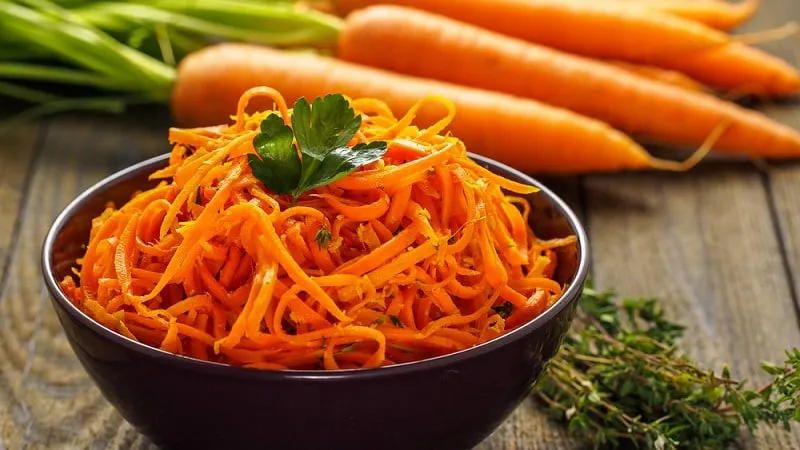
Calories, Macronutrients, and Glycemic Index of Raw and Cooked Carrots
The calorie content of raw vegetables differs from that of cooked ones.
Calories in carrots — raw, stewed, boiled, baked, and fried — are shown in the table below.
| Raw | Stewed | Fried | Baked | Boiled | |
| Calories | 41 kcal | 70.9 kcal | 199.5 kcal | 121.7 kcal | 27 kcal |
| Protein | 0.93 g | 4.4 g | 1.7 g | 2.7 g | 1.2 g |
| Fat | 0.24 g | 2.4 g | 17.5 g | 6.1 g | 0.1 g |
| Carbohydrates | 6.78 g | 7.7 g | 9.4 g | 13.3 g | 5 g |
| Organic acids | — | 0.2 g | 0.1 g | 0.6 g | 0.3 g |
| Dietary fiber | 2.8 g | 3.6 g | 1 g | 5.3 g | 2 g |
| Water | 88.29 g | 79.2 g | 68.3 g | 60.8 g | 91 g |
Raw carrots are 1.5 times higher in calories than boiled ones.
Stewed carrots lead in protein content. Carbohydrates double when baked.
Plant-based foods contain minimal fat. However, frying in vegetable or animal fats increases fat content.
Cooking carrots produces organic acids, making them easier to digest. Raw carrots are considered a "heavy" food, especially for people with digestive issues.
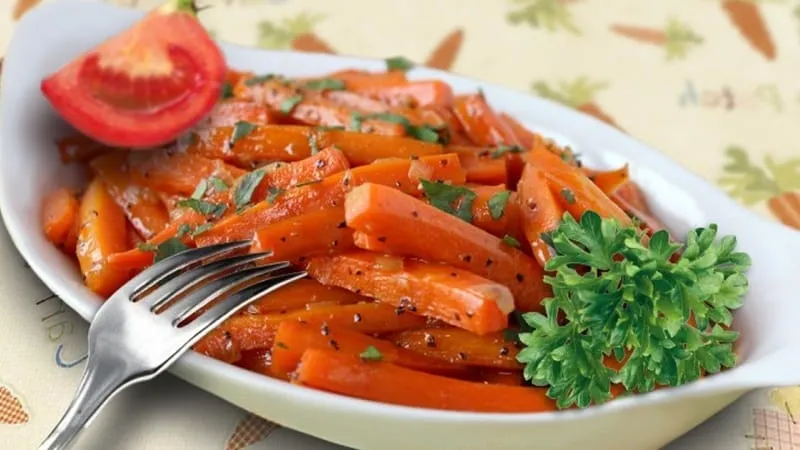
The glycemic index of carrots also depends on the cooking method. It increases when the vegetable absorbs moisture during cooking. Raw carrots have a low GI — 20. This means energy is released slowly.
Raw carrots take longer to digest than cooked ones. Blood sugar levels remain stable. Baked carrots digest quickly.
Chopping the vegetable increases its GI. Whole raw carrots have a GI of 20, while chopped ones have 35.
Carrot Juice
Fresh carrot juice is a low-calorie drink:
- calories — 56 kcal;
- protein — 1.1 g;
- fat — 0.1 g;
- carbohydrates — 12.6 g;
- organic acids — 0.2 g;
- dietary fiber — 1 g;
- water — 84.6 g.
Its glycemic index is high — 80. It’s best consumed diluted with water.

Carrot Greens
Nutritional value of carrot greens:
- calories — 35 kcal;
- protein — 0.6 g;
- fat — 0.1 g;
- carbohydrates — 5.3 g;
- dietary fiber — 2.9 g;
- water — 90 g.
Glycemic index — 20.
Korean-Style Carrots
The calorie content of Korean-style carrots depends on the amount of vinegar, oil, and preparation method.
Average values (per 100 g):
- calories — 112.6 kcal;
- protein — 1.2 g;
- fat — 8.2 g;
- carbohydrates — 9 g;
- dietary fiber — 4.8 g;
- water — 75 g.
Glycemic index — 63.
Health Benefits of Raw and Cooked Carrots
Eating raw vegetables isn’t always beneficial — for example, infants are gradually introduced to cooked vegetables.
Interesting fact: Orange carrots were first cultivated in the Netherlands. The original carrots were white, yellow, and deep purple, originating in Afghanistan.
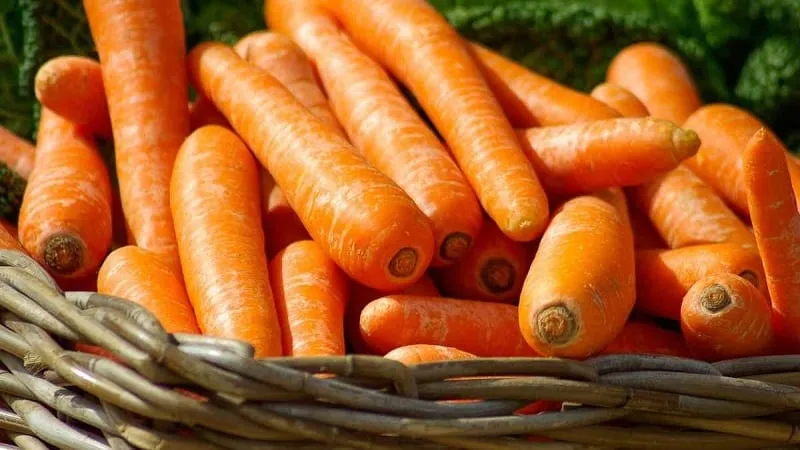
Health benefits of carrots:
- Vitamin A supports immunity, vision, and reproductive health.
- B vitamins aid nervous and cardiovascular systems, improve skin health, and promote cell growth.
- Vitamin C strengthens immunity and helps fight infections.
- Vitamin K enhances calcium absorption and prevents osteoporosis.
Carrot Juice
The advantage of fresh carrot juice is its quick absorption.
Carrot juice is often mixed with other vegetables or fruits to increase nutrient intake. If a child refuses pure carrot juice, try apple-carrot or carrot-orange blends.
Carrot Greens
Homegrown carrot greens are the most beneficial. Store-bought carrots may contain pesticides.
Benefits of homegrown carrot greens:
- fresh leaves add vitamin C to dishes;
- infusions help with skin conditions;
- rinsing hair with a warm infusion adds shine and strengthens roots;
- supports male reproductive health;
- used in pickling alongside dill and horseradish leaves.
Korean-Style Carrots
High fiber content improves digestion. The rough fibers stimulate intestinal motility.
Korean-style carrots help lower cholesterol and detoxify the liver. Vitamin E supports cardiovascular health and thins the blood.
Can Carrots Help with Weight Loss?
Nutritionists were cautious about carrot-based diets until the glycemic index of raw carrots was confirmed. At just 20, raw carrots are excellent for weight management.
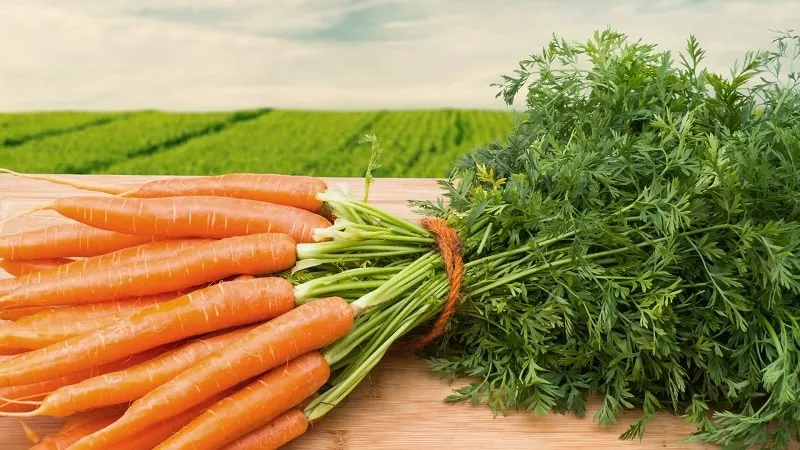
Boiled carrots, with a moderate GI of 50, are also suitable for weight loss.
Carrot greens, like any fresh herbs, don’t contribute to fat storage but provide essential nutrients.
Daily Intake Recommendations
Infants can start eating boiled carrots mixed with other vegetables after six months. Begin with one teaspoon. Diluted carrot juice can be introduced in small amounts.
For adults, the recommended daily intake is 200-250 g (2-3 medium carrots). Nutritionists suggest eating one raw carrot per day, with the rest cooked.
Carrot juice intake should not exceed half a glass daily. Mixing it with other vegetable or fruit juices is ideal.
Can You Eat Carrots Every Day?
Moderate consumption is safe unless you have an allergy.
Weight-Loss Carrot Recipes
Dietary carrot salads are nutritious and visually appealing.
Carrot and Apple Salad
Ingredients:
- 1 large green apple;
- 2 medium carrots;
- 1 tbsp lemon juice;
- 1 tbsp olive oil;
- 1 tbsp sunflower seeds;
- 1 tsp apple cider vinegar.
Instructions:
- Wash and peel the apple and carrots.
- Grate the carrots.
- Core and slice the apple.
- Add oil, lemon juice, and vinegar. Mix well.
- Sprinkle with sunflower seeds before serving.
"Three Vegetables" Salad
Ingredients:
- 2 medium carrots;
- 1 small beetroot;
- ¼ small white cabbage;
- 1 tbsp olive oil.
Instructions:
- Wash, peel, and grate the carrots and beetroot.
- Finely shred the cabbage and lightly crush it.
- Mix all vegetables.
- Drizzle with olive oil or lemon juice.
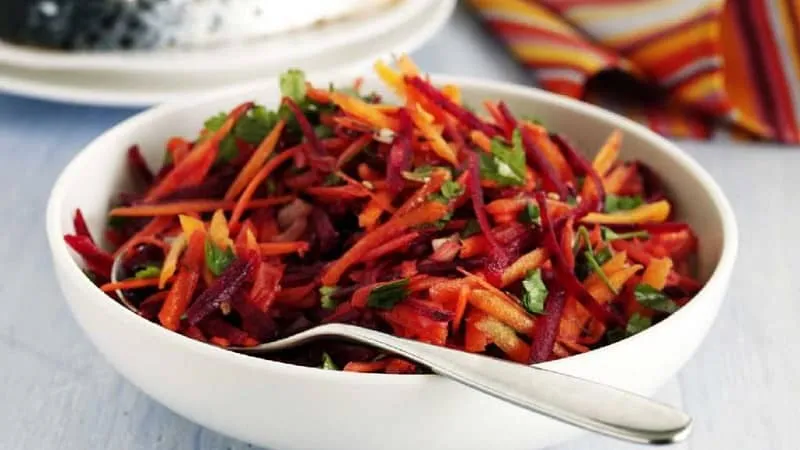
Carrot and Raisin Salad
Ingredients:
- 2 medium carrots;
- 100 g raisins;
- 1 tbsp honey;
- 100 g low-fat yogurt;
- cinnamon to taste.
Instructions:
- Wash, peel, and grate the carrots.
- Soak raisins in hot water for 10 minutes, then drain.
- Mix honey and yogurt for the dressing.
- Toss carrots and raisins with the dressing.
- Chill for 15-20 minutes before serving.
Potential Risks and Contraindications
Despite its benefits, carrots aren’t suitable for everyone.
Warning! Avoid carrots if you have an allergy.
Consume with caution if you have:
- pregnancy or breastfeeding;
- stomach ulcers or duodenal issues;
- rectal inflammation.
Excessive carrot juice may cause "carotenemia" — a harmless yellowing of the skin due to beta-carotene overload. It fades once intake is reduced.
Conclusion
Depending on preparation, carrots can lose or gain nutrients. Eating them in any form is beneficial, though cooked carrots are more calorie-dense.
Raw carrots are a dietary staple in many weight-loss plans.







